Java vs .NET vs Python vs Ruby vs Node.JS: Who Reigns the Job Market?
We crunched 351,799 job openings – Here are the languages you need to master to get them
Every now and then a new article/blog post/opinion piece/twitter rant is published wondering about the future of Java. However, the cold facts state that it’s still the most popular language in the programming world, but what does it actually mean?
In the following post we’ll dig into the buzz around Java through analysing the current job market, focusing on server side languages. Who knows, it might even help you find your next position.
Java rules the domain
For some Java might mean a hot cup of coffee, but for us it’s one of the most practical programming languages; it’s concurrent, class-based, object-oriented and designed to have as few implementation dependencies as possible. If you’re not into that factual lingo, the main selling feature here is “write once, run anywhere”, allowing us to run our code on every Java supported platform without having to recompile it.
There’s no doubt Java is popular. It’s the second most popular programming language, and it is the base for pretty much any other object oriented principles language. If you ask Oracle, they can show you some numbers that go along with these statements:
- 97% of Enterprise Desktops Run Java
- 89% of Desktops (or Computers) in the U.S. Run Java
- 9 Million Java Developers Worldwide
- 3 Billion Mobile Phones Run Java
In order for us to see how popular Java really is, we decided to look where it counts: the job market. We focused on the 2 popular job hunting sites: Glassdoor and Indeed, inside the US market.
Looking for a job? Look for Java
Just like any other person looking for a job, we searched the term “Java” in Glassdoor, limiting the result to the US, and got 60,322 results. Among the different positions available, you can apply for Java/J2EE Developer, Test Automation Engineer, Software Engineering Team Leader, Full Stack Software Engineer and even be a Java teacher for an online class.
We ran a similar search on Indeed, focusing on developers and engineers. This search landed us with 62,249 available positions. There’s a variety of positions available here as well, such as Back End Services Engineer, Test Automation Engineer, Applications Developer and so on.
Programming and StackOverflow go hand in hand, and that’s why we decided to look on it as well. When searching for Java we found 1,088,646 tagged questions, which indicate the overall popularity of this language.
These numbers mean that if you’re looking for a job in the Java field, you have a lot of options to choose from. But how do they reflect Java popularity? For that, we’ll have to look for open positions in other languages.
First, we chose those who are relevant to us: C++ and .NET. While the numbers are still high, they’re lower than Java. For C++, you’ll find 28,879 jobs on Glassdoor, and 34,451 jobs on Indeed with our developers and engineers filter. If you’re more of a .NET programmer, you can choose from 23,509 jobs on Glassdoor and 32,801 on Indeed, and you should be aware of the decrease in demand, as the following chart shows:
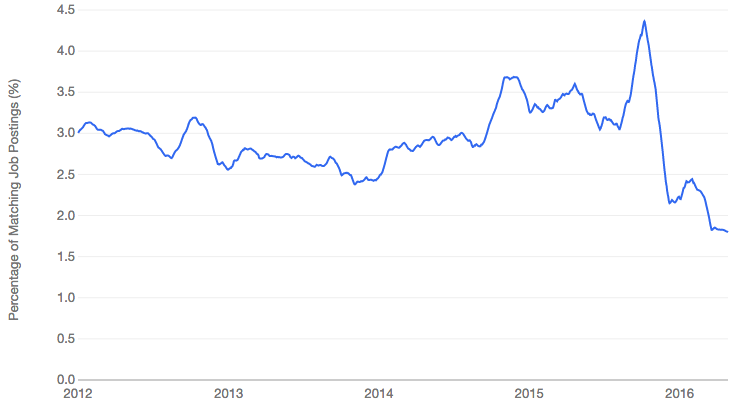
What about “younger” languages you ask? When looking for Python the numbers slim down to 29,800 jobs on Glassdoor and 32,434 on Indeed, and Ruby offers you 12,928 jobs on Glassdoor and 14,303 jobs on Indeed. The demand for Node.js seems lower, with 4,805 jobs on Glassdoor and 6,277 jobs on Indeed.
FYI: Indeed indicates that the average Java salaries for job postings nationwide are 77% higher than average salaries for all job postings nationwide.
Java is the prom queen
TIOBE, the programming community index, show similar results in its June report. Java is the most popular language, and it has been holding this title for a few long years. C++ and .NET are not far behind, holding places third and ninth respectively.
It’s interesting to see that Python hold the honorable fourth place and Ruby is placed at number 10 – indicating that they are on the rise, but apparently it’s still not enough to make a significant impact on the job market.
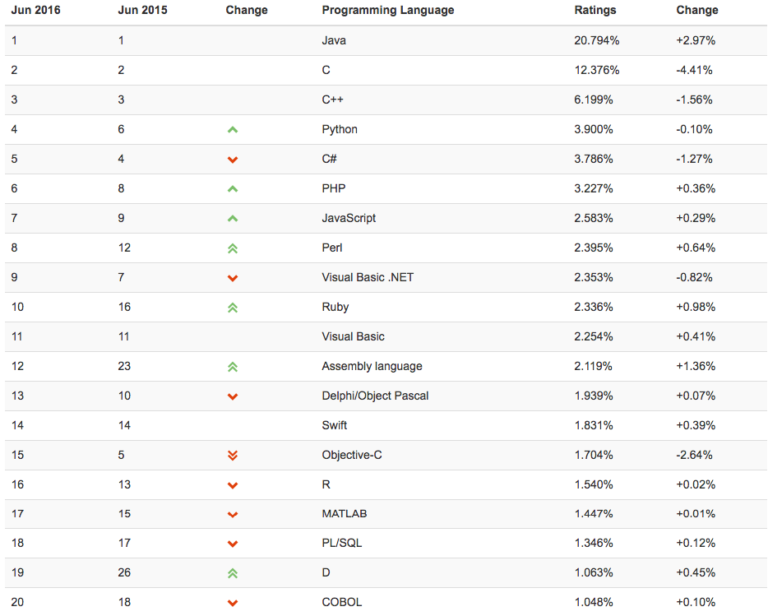
Not just for Java
We know what you’re thinking, there are other JVM languages beside Java – what about them? Right now, while the job market does offer a handful of positions, it’s not likely they’ll take over soon.
When searching for Scala positions, the numbers slim down to 2,618 jobs on Glassdoor and 4,242 jobs for developers and engineers on Indeed. When it comes to Clojure, we found 461 jobs on Glassdoor and 575 on Indeed.
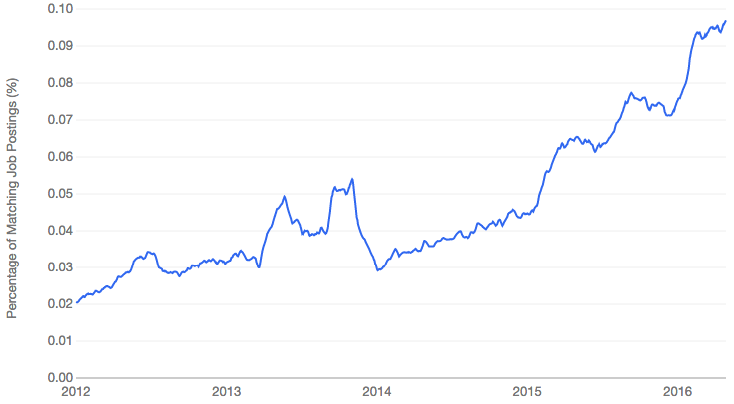
We decided to look if there are any open positions in the Reactive Programming Framework, used by Java and Scala developers. The numbers grew a bit, with 2,224 jobs on Glassdoor but only 404 jobs on Indeed. It also seems that Akka, which is also used by Java and Scala developers, is less popular, with 283 jobs on Glassdoor and 427 jobs on Indeed.
What about something a little less popular? When searching for Jython we got 228 jobs on Glassdoor and 178 jobs on Indeed, JRuby has 104 jobs on Glassdoor and 107 jobs on Indeed and Kotlin has a low number of 10 open jobs on Glassdoor, and 34 jobs on Indeed.
We also ran a search on “Groovy”, and though Glassdoor showed 1,318 jobs, Indeed had no less than 14,663 jobs. We thought it was a little weird, and an in-depth look taught us that people still use “Groovy” as an adjective to describe what kind of people they’re looking for. We know, it’s embarrassing.
In order to get some clue about open positions for Groovy developers, we narrowed down the search term to developers and engineers, and got a reasonable number of 1,795 jobs available.
Rise of the Devops
One of the new buzzwords everyone has been looking for lately is Devops. While the actual meaning of this word is to emphasize collaboration and communication of software developers and IT professionals, it doesn’t apply (get it?) to the job market.
One Devops description doesn’t match another; some companies require high programming skills, while other are looking for someone who knows how to create basic scripts and handle APM tools (shameless plug: like Takipi).
When searching for Devops we found 22,506 jobs Glassdoor and 11,487 jobs on indeed. But all you really need is one look at the following chart to get the picture. Devops are the new orange.
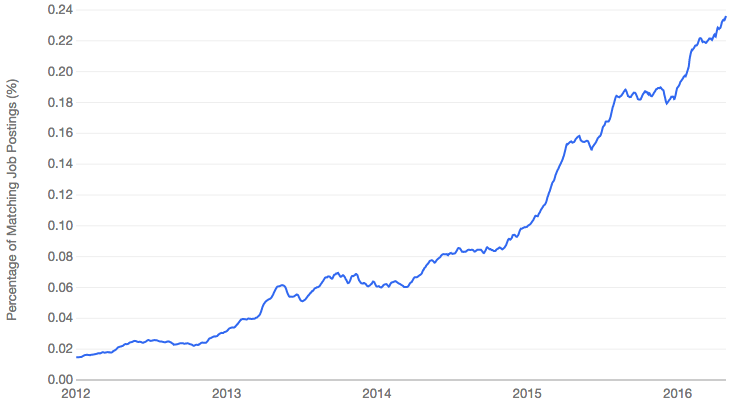
We also tried breaking it down and search for the 2 major tools every Devops engineer should know: Chef and Puppet. Puppet shows 2,685 jobs on Glassdoor and 3,809 jobs on Indeed.
Just like Groovy, we got a lot of irrelevant results when searching for “Chef” (unless you’d like to change your life and become a catering chef). However, searching for Chef and limiting the results to Devops, we got 2,862 jobs on Glassdoor and 4,048 jobs on Indeed.
Final Thoughts
Numbers are great and we love them. Just the other week We Crunched 1 Billion Java Logged Errors and then found the The Top 10 Exception Types in Production Java Applications. But all of the numbers included in this post say something about the state of Java: it’s still going strong and it’s here to stay. At least for the next decade.
| Reference: | Java vs .NET vs Python vs Ruby vs Node.JS: Who Reigns the Job Market? from our JCG partner Henn Idan at the Takipi blog. |

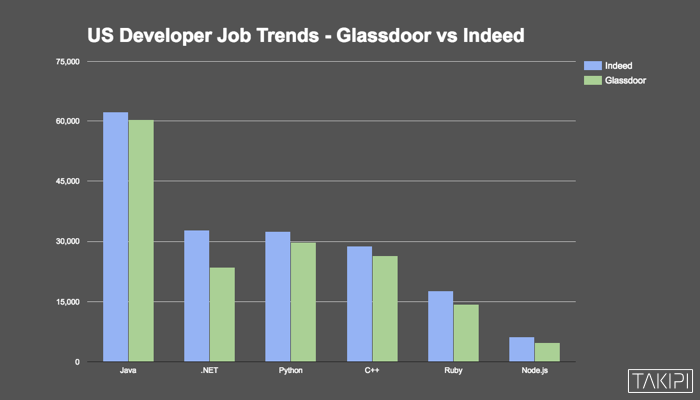

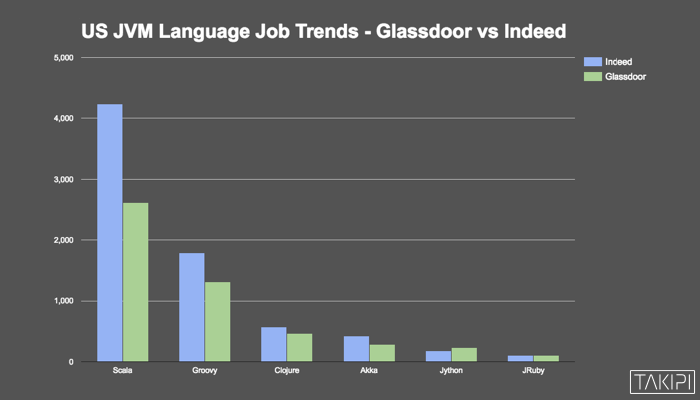





This data is only meaningful when it is expressed as a ratio to the number of developers applying for the opportunity. As the total number of candidates for each job increases, the opportunities drop along with the compensation. In my area the market has been flooded with Java developers from three universities less than 15 miles apart. The result is that Java developers take longer to find a job and are paid less when they find one. I’m a .Net developer and I never have problems finding work that pays well. While the number of .Net jobs available is lower,… Read more »
YOU ARE ABSOLUTELY RIGHT! CONGRATS FROM BRAZIL
I couldn’t agree more!!! You nailed it.
The reason there are many job openings for java developers is that over the years many enterprises believed the OOP hype about java being (and JAVA is not concurrent ) write once run anywhere. Now that the apps are in place there are many problems, and the main jobs are maintenance job created by the previous developers. Witness some of the job adds: Wanted expert java programmer must know threading to come clean up production. Strong understanding of multithreading, garbage collections to clean up crap left behind by last developers. the best one Job responsibilities: ….. JVM restarts ….. and… Read more »
Java, JavaScript, PHP are just like Justin Beiber.
They sucks, but they are popular.
What does “younger” languages mean?
Java 1995
Python 1991
Ruby 1995
Perl 1987
PHP 1995